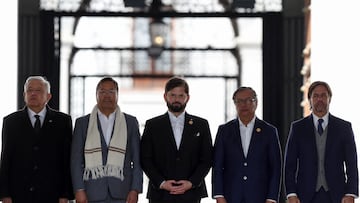How many times have there been a military coup in Bolivia?
President Luis Arce denounces the mobilizations of soldiers in front of the Government in La Paz in the second coup attempt in five years.


The president of Bolivia, Luis Arce, denounced this Wednesday “irregular movements” of soldiers in front of the Government headquarters in the city of La Paz, in Plaza Murillo. Citizens and some local media in the city confirmed the presence of tanks and armed soldiers.
This has been testified by the former president of Bolivia, Evo Morales, through his X account.
BREAKING: Military enters Bolivia's Palacio Quemado by force, running an armoured vehicle into the palace doors as a coup is underway. @teleSURtv pic.twitter.com/DjX0Y8pkpT
— Kawsachun News (@KawsachunNews) June 26, 2024
In November 2019, Bolivia was nearly put under a military dictatorship. when Arce’s elected predecessor Evo Morales, both of the same Movement for Socialism (MAS) party, was forced out of the country. Opposition senator Jeanine Áñez then declared herself interim president, backed by the military. Áñez’s ‘government’ granted the military immunity from prosecution after they killed at least 33 pro-Morales protestors.
In October 2020, Luis Arce won the rescheduled election. Áñez was later arrested and charged with terrorism, sedition and conspiracy related to the 2019 events. MAS alleged the events amounted to a coup d’état orchestrated by the opposition with foreign support, particularly from the US and Organization of American States (OAS), which both decried Morales initial victory.
BREAKING: Bolivian armed forces have surrounded the government palace in Bolivia's Plaza Murillo in an apparent coup attempt. pic.twitter.com/GfVsEMWPzJ
— Kawsachun News (@KawsachunNews) June 26, 2024
Bolivia has experienced over 190 coups d’état and revolutions since its independence in 1825.
Bolivia’s rich supply of lithium
Related stories
The South American nation found large reserves of lithium, crucial for the production of micro-processors, in its territory 2018.
“We are the only political party that guarantees that natural resources, including lithium, will not be privatized and handed over to transnationals,” Arce told The Jacobin in 2020. “Evidently, the economic objective [of the coup] was the control of lithium.”

